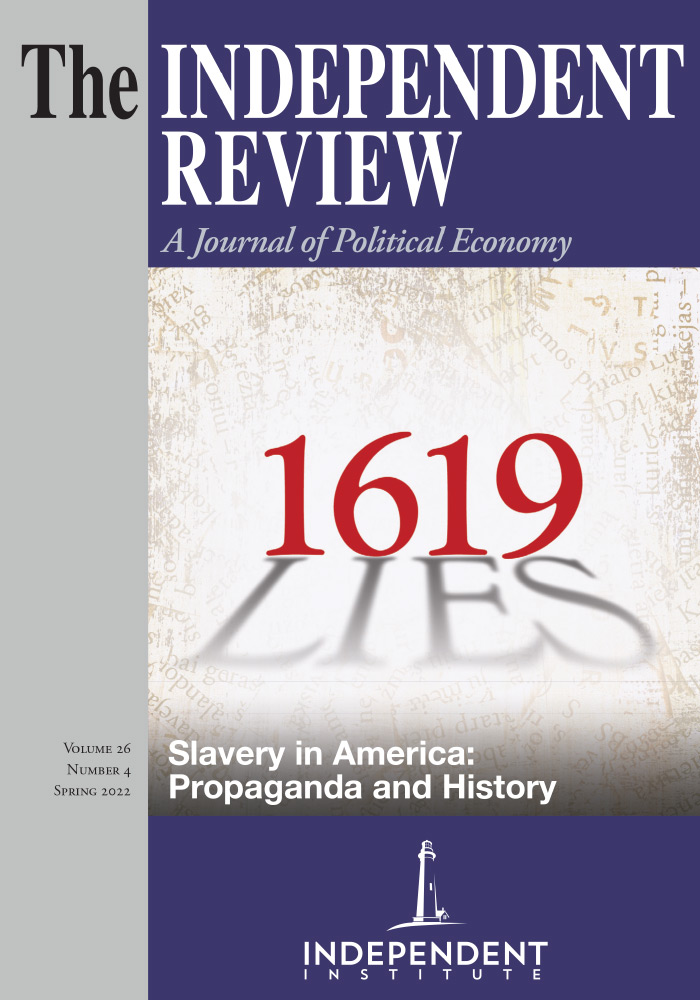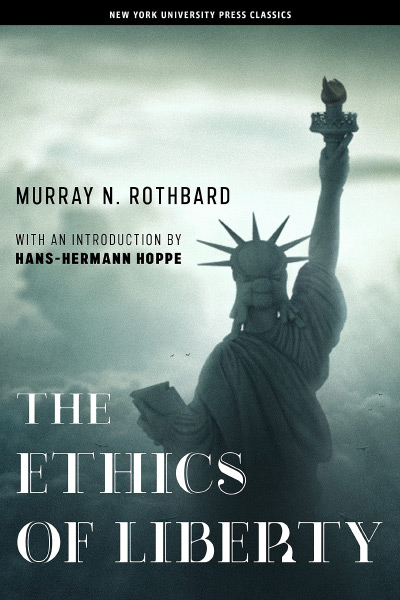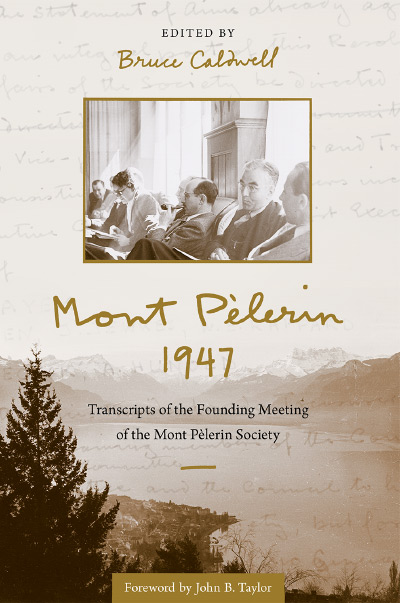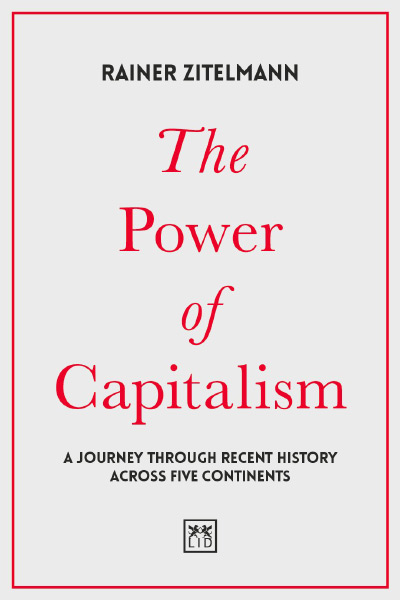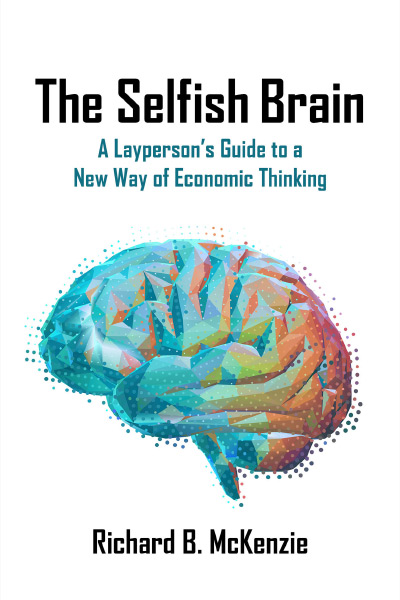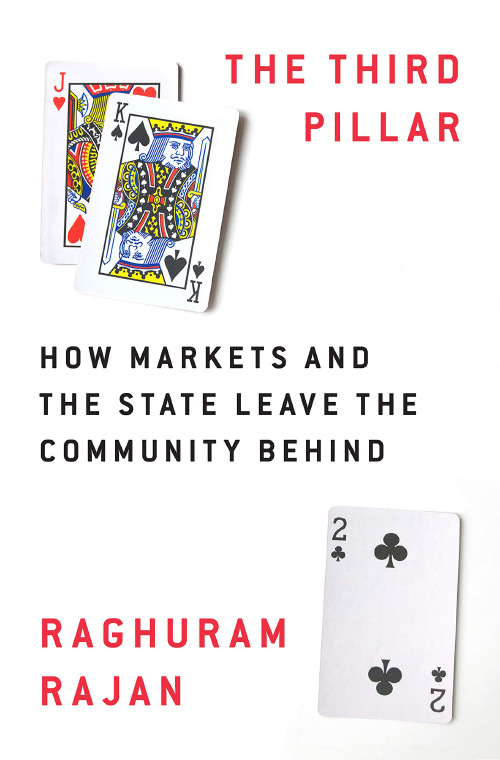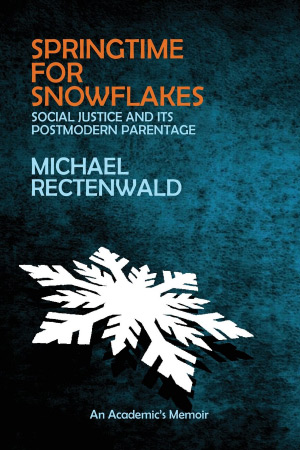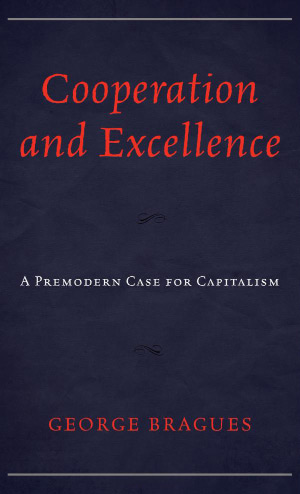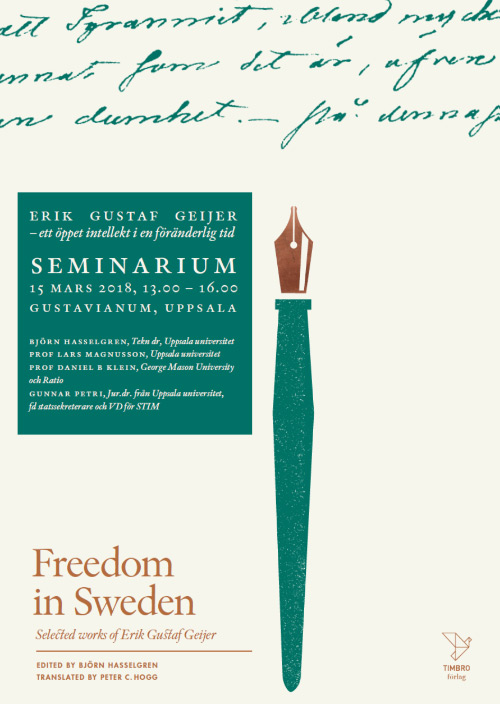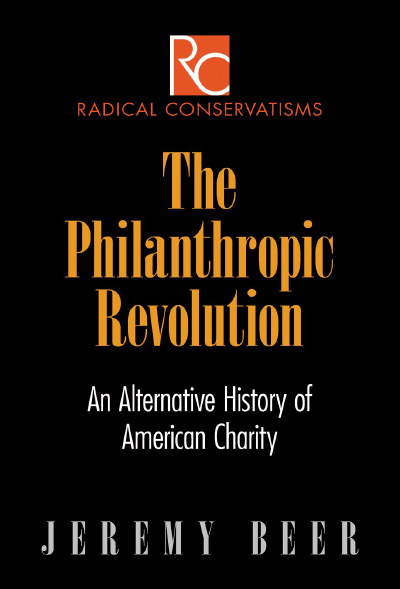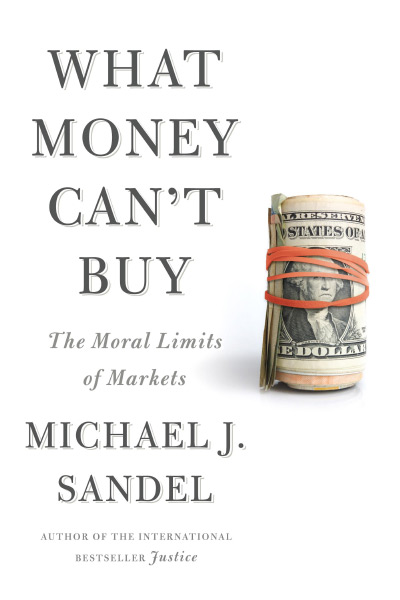Whenever I am asked by people to recommend the best publications on libertarianism, I always mention two books by Murray N. Rothbard: The Ethics of Liberty, and For a New Liberty. It is my pleasure and honor now to be able to review the first of these two volumes.
Let me start on a negative note: the title of this book is misleading. As Rothbard himself demonstrates over and over again, libertarianism is a theory of just law. It states that the use of violence should be limited to defense, not offense. It should be predicated on the non-aggression principle (NAP) based upon private property rights, which stem from homesteading of virgin territory and voluntary actions (buying, selling, lending, gift giving) afterward. What is the relation of all of this to ethics? Libertarianism is but a small part of the latter. Ethics involves issues like whether you should respect your parents, be lazy, or get drunk; libertarianism has little to do with any of these issues. Thus, the title of this book is misleading because it implies it concerns all of ethics. There are four sections of this book: I: Natural Law, II: A Theory of Liberty, III: The State versus Liberty, and IV: Alternative Theories of Liberty. A far more descriptive and thus accurate title for the entire volume would have been the heading of section II: A Theory of Liberty.
In section I Rothbard brilliantly justifies the entire enterprise of liberty. He predicates it upon natural law. It is in the nature of man to be free, to be at liberty, not to be coerced against his will. Nor does he base this on theology, or mysticism, as do some other justifications of liberty. Rather, reason is his foundation, science his guide. What are some of the other justifications? In the view of Ayn Rand, it all starts with A = A. For the pragmatists, or utilitarians, liberty is justified because it brings about the greatest degree of human happiness and prosperity. Hans-Hermann Hoppe, a follower of Rothbard, bases the justification of the argument from argument. [I’m not sure what the previous sentence means.] Rothbard’s justification is as good as any, better than many.
Part II of this book is the nitty-gritty of it. Here, Rothbard wrestles with a whole host of challenges for libertarianism, including property, criminality, land theft and reparations, punishment, how to deal with children, bribery, boycotts, contracts, lifeboat situations, and animal rights. What do all these chapters have in common? The thread that runs through them is Rothbard’s utter and total refusal to compromise on the principles of libertarianism, the NAP, and private property rights. Wherever these foundations lead him, Rothbard is sure to go, with no fear or favor, no compromise with traditional or widely accepted views.
He begins with Robinson Crusoe, a pattern used by many economists. This strips all complications down to the bone. He establishes that this individual “owns his own body. . ., the very fact that the knowledge needed for man’s survival and progress is not innately given to him or determined by external events, the very fact that he must use his mind to learn this knowledge demonstrates that he is by nature free to employ or not to employ that reason. . . .” (p. 31, emphasis added). If that is not a ringing endorsement of natural law, then nothing is. Rothbard sees “freedom as an absence of molestation by other persons” (p. 31) which sets the stage for the next chapter, in which he introduces additional people, and maintains that the only legitimate interaction between them is one of voluntary agreement. He attacks parasitism, invasions of person or property, on the ground that it cannot be universalized. This leads seamlessly into his next chapter, in which criminality is seen as invasion of someone else’s property in himself or his properly owned possessions.
How could we extrapolate from Rothbard’s chapters on land theft and land monopoly to the presently pressing problem of reparations to black people for slavery which ended over a century ago? He would reject both mainstream views. The left-liberal position is that since whites enslaved blacks, all whites now owe all blacks compensation. This is easily refuted by the fact that some blacks were slave owners and that many blacks came to this country after 1865, as did many whites. The right-wing perspective is that since no one living today in the U.S. was either a slave or a master, no one owes anything whatsoever to anyone else. Thanks to this eminent philosopher-economist, we have a third alternative. All extant property is presumed to be valid. The burden of proof rests with anyone who wishes to rearrange property titles. If there is some black person who can prove his great grandparent was a slave on the XYZ plantation, then he can sue for a proportionate part of that holding. How so? He can do so on the ground that what should have happened in 1865 was an ex post facto declaration that slavery was a crime, and the slaveholder a criminal. He should not have been able to hand over his plantation to his progeny. Rather, it should have been divided up among his slaves as punishment for the crime of slave ownership and at least partial compensation to them. And, in the natural course of events, those properties would have passed on to the black great grandchildren of those slaves. They and only they would have a right to reparations, and only from the holders of those plantations.
Rothbard is particularly brilliant in his chapter on self-defense. He establishes that promise breaking should not be illegal. He maintains that only if there is some sort of theft in an action should it be considered criminal. But if A promises to marry B, and then reneges, there would be no robbery, even if B spent money in the expectation that the promise would be fulfilled. On the other hand, “if Brown lends Green $1000 this year in return for the delivery of $1100 next year, and Green fails to pay. . . .” (p. 79) then indeed theft has taken place. You’ve heard of “no harm, no foul?” Here, we have “no theft, no crime.”
Rothbard derives from libertarian principles that punishment for a crime should be proportional to its severity. He totally rejects deterrence as a criterion. He offers the following reductio: more people will be tempted to engage in shoplifting than murder. Therefore, the penalty for the former should be greater than for the latter. Also, executing a man only the police know to be innocent would greatly deter crime. But would this be just? Hardly. What about “rehabilitation?” Rothbard gives the back of his hand to that “humanitarian” scheme. A mass murderer could walk out of prison in a day if those in charge think he has been reformed, while a petty thief could suffer life in prison, with the opposite arbitrary assessment.
Children always create problems. Ask any parent. Something similar occurs in Rothbard’s chapter on this subject, and here he and I part company. Adults are self-owners, due to rationality in his view, but this hardly applies to children. Let us start at the beginning. Mr. Libertarian sees the creation of the human being demarcated at birth. In my view, this is a mere change of address. The baby, one hour before and after birth, has not changed any more than you or I, two hours apart. I agree with him that the mother is the absolute owner of her person, and, thus, the unwanted fetus is an invader, a trespasser. She thus has the right to expel him, but not to abort him, as Rothbard would have it, since abortion encompasses two separate acts: expulsion and killing. The baby in the third trimester is viable outside of the womb; the mother has only the right to expel this young human being, not to kill him, as Rothbard would have it.
The two of us certainly agree that libertarianism encompasses only negative, not positive rights. However, Rothbard’s deduction from this goes awry: “The parent should have the legal right not to feed the child, i.e., to allow it to die” (p. 100). And, presumably, there is no obligation to bring the unwanted, unfed, baby to a hospital, or orphanage so as to allow others to care for him. I maintain not that they have a positive obligation to do any such thing, but, that if they do not, they will be guilty of the crime of forestalling, or precluding. This would be akin to homesteading land in the formation of a bagel or donut: they would be controlling the “hole” land without having homesteaded it. For both Rothbard and me, the parent may not own the child; rather, he is the guardian. But the parent only retains that relationship insofar, and as long as, he cares for the child. Refusing to feed him certainly will not support this right. So, the parent who is no longer a guardian, and yet precludes others from taking on that responsibility is akin to the bagel homesteader: controlling land he has not homesteaded. (Here, I am implicitly assuming no helicopters, bridges, tunnels, etc.)
In a very insightful chapter Rothbard attests that there is no more to “human rights” than “property rights.” The human right of free speech, for example, is merely the right to speak on your own property, or with the permission of the owner, not anywhere else. Yes, you can yell “fire” in a theater, but only in a sado-masochistic establishment where the owner consents to such behavior. If the streets were privatized, there would be no question of who has the right to speak or march there; it is only with government ownership that the human right of free speech can give rise to clashes of rights.
What about libel and slander? These should be legalized. Yes, they ruin reputations, but these consist of the thoughts of other people, and hence cannot be owned by the target of the scurrilous attack. Nor is there any right to privacy. You want some? Go pay for it. Live in a gated community. Rothbard is kind enough to mention my views to the effect that blackmail should be legalized (p. 124). But the credit for this insight goes to him. I won’t say that all of my contributions to libertarian theory stem from me standing on his shoulders, only the overwhelming majority of it qualifies, but this one is certainly included. Blackmail is the payment for the service of keeping quiet about someone else’s secret. It is a voluntary consensual contract, with no theft explicit or even implicit. Ditto for “bribery.” That is merely a pejorative for an agreement disapproved of by a third party. Boycotts, too, fall under this rubric. An important foundation of libertarianism is free association. No one should be compelled to associate with anyone else against his will. A refusal to enter into a commercial or any other kind of relationship with another person is thus a “human right.” Bankruptcy laws fall under the suspicious gaze of this author. They are merely a means of allowing debtors to steal from creditors.
Then there is his magnificent chapter on lifeboat situations. Many philosophers shrink from such hard cases, or jettison all their principles when confronting them, but not this one. True to his basic premises, Rothbard grounds his analysis in, you’ll never guess, yes, private property rights. The solution is: who is the owner of the lifeboat, or the single piece of wood that can save only one of two aspirants for it? And, if no owner can be determined, then, who is the first homesteader of it? It is only if we have an exact tie in this regard that libertarian theory is indeterminate on this question. Rothbard ends this section with a rejection of animal rights: “After all, animals don’t respect the ‘rights’ of other animals” (p. 156). Well and truly said.
Section III is a tour de force on behalf of the case for free market anarchism. A methodological individualist, Rothbard maintains that people calling themselves “the government,” or “the state,” have no more rights than any of the rest of us. If it would be a crime for one individual to “tax” i.e., rob another, then, too, it should be considered lawbreaking for a group of people with fancy nomenclature to do so as well. The same holds true for anyone to use violence to prevent his competitors from offering their services to the general public. But the government insists upon a monopoly of the provision of justice and the ultimate police power. Rothbard is particularly intent upon shining a light on “Court Intellectuals” (p. 168) who weave apologetics for the government. Yes, this organization “has no clothes” after Rothbard rips their arguments into shreds.
Section IV is where our author subjects the theories of several scholars who have views similar to his own. This is very important, since discerning readers will want to know where he separates himself from these others. He takes to task the public choice and the unanimity and Pareto optimality principles of James Buchanan: “If the status quo is unjust or repressive of liberty, then the Unanimity Principle is a grave barrier to justice and liberty rather than a bulwark in its behalf” (p. 203). Rothbard criticizes the utilitarianism of his friend and mentor Ludwig von Mises, doubting that from value-free premises one can deduce libertarian conclusions. Mises rests his case on the economic ground that socialism, interventionism, is problematic even from the point of view of its supporters. But Rothbard trenchantly asks: how can we know their motives? Maybe the Bernie Sanderses of the world favor the minimum wage because they think it will lessen the plight of the poor. But it is also possible that they favor this legislation because they hate the unskilled and want to see them miserably unemployed.
Nor does Isaiah Berlin escape the probing analysis offered in this book. This author confuses freedom with opportunity; he conflates positive and negative rights, pretty much a rookie mistake in political economy. Friedrich Hayek, too is subject to scathing Rothbard criticism. Being clear on what is coercion is surely a crucial element of not only libertarianism, but of any political philosophy worthy of the name. And yet Hayek applies this to an employer firing an employee during a period of “acute unemployment” (p. 220), to the legitimate owner of an oasis who sells water at a very high price or not at all. This is hardly support for private property rights, the be-all and end-all of economic freedom. Robert Nozick does not escape Rothbard’s intellectual wrath either. This author sees a process whereby an industry comprised of private defense agencies will be led by an “invisible hand” to form a government, a limited one, but, still, an organization that necessarily violates rights. How does this work? Suppose two defense agencies come to opposite findings on a case. How will they resolve matters peacefully? They can agree to abide by a mediator’s decision or set up mutually agreeable rules to determine which firm is in charge of which issues. Nozick continues: “Thus emerges a system of appeals courts and agreed-upon rule. . . . Though different agencies operate, there is one unified federal judicial system of which they are all components.” Rothbard pounces on the “thus.” The latter simply does not logically follow from the former. Two private police-court agencies settling their differences does not a government make.
I diverge from Rothbard on an economic issue. He states (p. 35): “If all people were equally skilled and equally interested in all matters, and if all areas of land were homogeneous with all others, there would be no room for exchanges.” In my view, even under such restrictive circumstances, specialization and division of labor would still increase wealth, and thus “there would be room” for people to avail themselves of these divergences. Some would be farmers; others, musicians; and each would become better at these callings if they focused on them, even though all people initially had the same tastes and ability to pursue them.
I also deviate from Rothbard when he attacks the legality of voluntary slavery (p. 40). What is his reasoning here? He states: “For this would mean that his future will over his own person was being surrendered in advance. . .(but) he cannot rid himself of his own will which may change in future years and repudiate the current arrangement.” My response is “will schmill.” I care not for the person’s will, only whether or not it should be legal to compel people to adhere to all contracts, including sales of one’s body to someone else. My motto here is that if you can’t sell it, you don’t really fully own it. If you can’t sell yourself to someone else, you are thus not a full self-owner of yourself.
The argument here is really about specific performance contracts. A is a tightrope walker, 100 feet above the ground. He hires B to hold a net under him in case he falls. Halfway through his act, B changes his “will” and decides to walk off the job. Would A be justified in compelling B to continue to hold the net under him? Rothbard says no. I respectfully disagree.
I have read this book again and again. I have learned from it each time. It has been an inspiration to me. Many of my own publications are derived directly from it. I highly recommend it.
| Other Independent Review articles by Walter E. Block | ||
| Spring 2023 | Defending Liberty: Essays in Honor of David Gordon | |
| Winter 2018/19 | Crony Capitalism versus Pure Capitalism | |
| Fall 2015 | A Troublesome Inheritance: Genes, Race and Human History | |
| [View All (4)] | ||

